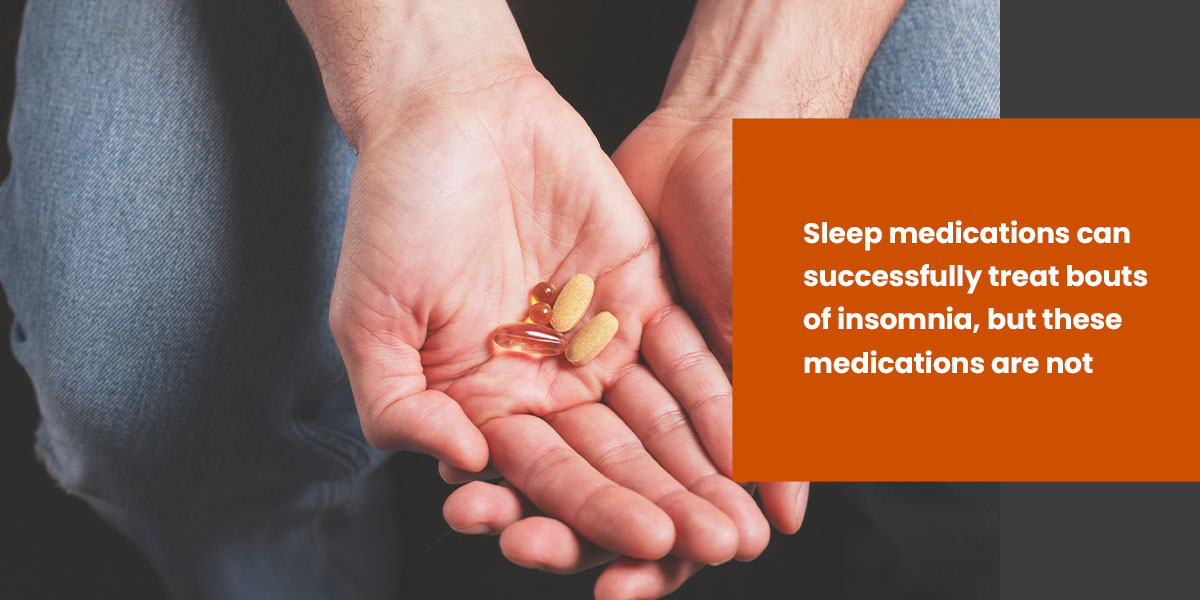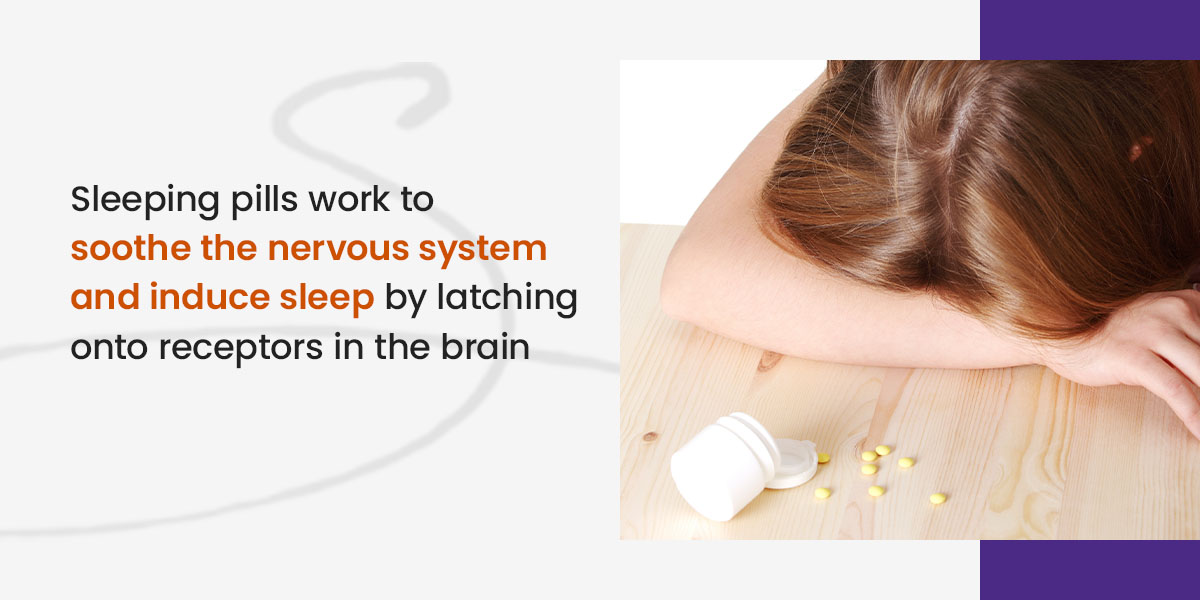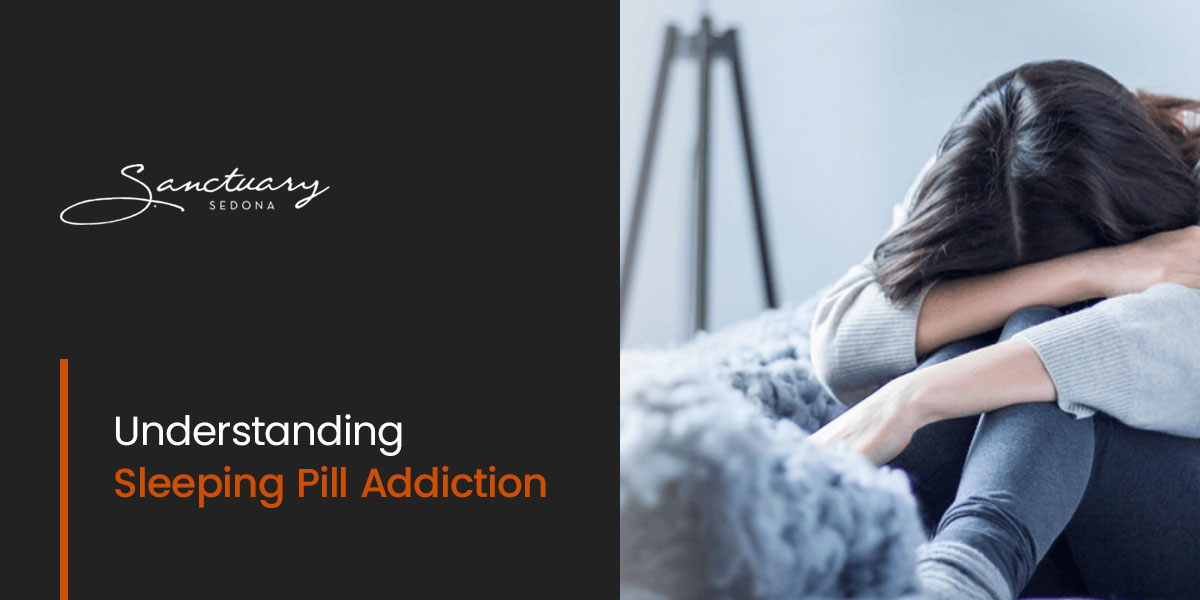Almost all of us have been there, tossing and turning in frustration, fighting off anxious thoughts, pacing back and forth to the fridge or scrolling through white noise sounds in hopes that sleep will eventually take over. For some, trouble sleeping is a rare complaint. But for others, days of sleep deprivation can put a strain on day-to-day life.
Sleep medications can successfully treat bouts of insomnia, but these medications are not intended for long-term use. They should only be used on occasion when getting a good night’s rest seems impossible.
Here’s everything you need to know about sleeping pill addiction, symptoms to look for and how to get help.
The Different Types of Sleep Medications
Below are some of the most commonly prescribed medications for treating insomnia. Most of these medications require a doctor’s prescription, while others are available over the counter:
- Z-drugs: Zolpidem, Zaleplon, Eszopiclone and Zopiclone are part of Z-drug sleep medications.
- Benzodiazepines: Alprazolam (Xanax), Diazepam, Etizolam, Temazepam (Restoril), Triazolam and Clonazepam are a class of sleeping pills also known as Benzos.
- Non-benzodiazepine hypnotics: Zolpidem (Ambien), Eszopiclone and Zaleplon are hypnotic drugs used to treat anxiety disorders and short-term insomnia.
- Barbiturates: Amobarbital, Butalbital, Primidone, Butisol, Nembutal, Mebaral and Seconal are some Barbiturates used to treat seizure disorders and extreme bouts of insomnia.
- Antidepressants: Trazodone, Mirtazapine and Quetiapine are antidepressant medications used to treat sleep disorders.
- Over-the-counter sleep aids: Melatonin, Benadryl and sedating antihistamines are over-the-counter sleep aids.
While these medications can induce sleep, they are associated with various side effects. Long-term frequent use of these medicines can cause an array of unpleasant symptoms, including sleepwalking, sleep eating, daytime grogginess, brain fog, memory loss and even hallucinations, depending on the specific medication. But more than that, using sleeping pills regularly raises dependency risks.
Even over-the-counter sleep aids are linked to side effects like dizziness, confusion, blurred vision and dry mouth. Frequent or long-term use of these medications can also increase tolerance.
Are Sleeping Pills Habit-Forming?
Sleeping pills work to soothe the nervous system and induce sleep by latching onto receptors in the brain. When repeatedly using these medications, the brain develops tolerance through a neurological process that shuts down some receptors in an attempt to balance out chemicals. When this happens, the brain tries to acclimatize and becomes dependent on the medication in the process. Sleep medications become less effective, and many people find themselves increasing their doses to get the same sleep-inducing effects.
The Signs of Sleeping Pill Addiction

As dosages increase over time, tolerance keeps rising, and the brain becomes more and more dependent on the medication, resulting in a sleeping pill addiction.
Understanding the signs of a sleeping pill addiction is critical to seeking treatment. If you or a loved one experiences some of the following symptoms of pill misuse, it’s essential to seek treatment:
- Cravings for sleeping pills: A chemical imbalance in the brain will prompt your nervous system to crave the medication that has caused the imbalance. As with cigarettes, alcohol and other addictive substances, cravings are a symptom of dependence.
- Visiting multiple doctors or drug stores for refills: As tolerance and dependence increase over time, individuals tend to visit several doctors for script renewals or fill the script at multiple drug stores to prevent running out and enduring cravings, worsened insomnia and other unpleasant symptoms.
- Using sleeping pills when they are not needed: Sleeping pills are only safe to use short term. Ideally, patients should use sleeping pills to control bouts of insomnia over periods of no longer than two weeks. Using sleeping pills out of habit rather than to aid sleep occasion is the result of an addiction.
- Memory loss and depression: The side effects of long-term sleeping pill use can include memory loss and depression. These symptoms are often overlooked as signs of pill misuse.
- Increasing dosages without professional guidance: It is only safe to increase medicine dosages under the guidance of a health care practitioner. Increasing dosages independently is a sign of substance misuse.
- Trying to quit and failing: Patients experiencing sleeping pill addiction sometimes note the side effects and eventually attempt to stop using the pills. However, because withdrawal symptoms can kick in, patients tend to relapse.
- Experiencing withdrawal symptoms: Sleeping pill misuse can lead to various withdrawal symptoms when not taken.
When using sleeping pills for insomnia and difficulty falling or staying asleep, it’s vital to carefully follow the instructions provided by a doctor as well as the usage guidelines on the medications insert.
Sleeping Pill Addiction Withdrawal

The symptoms of sleeping pill withdrawal can vary from mild to severe and life-threatening, depending on various factors. The type of sleeping pill, dosage and length of use impact the severity of withdrawal symptoms.
The common symptoms include:
- Increased anxiety and restlessness
- Tremors
- Headaches
- Sweating
- Muscle pain
- Nausea and vomiting
- Rebound and worsened insomnia
- Hallucinations
- Delirium or confusion and disorientation
- Psychosis
- Seizures
The symptoms of substance withdrawal are understandably unpleasant. It’s essential not to persist through these symptoms without medical guidance, as even mild symptoms can spiral. Xanax withdrawal, in particular, causes withdrawal symptoms that are known to come and go. Individuals might believe that they are fine one day after bouts of tremors, muscle aches and sweating ease off, but seizures or psychosis could present a few days later. Symptoms of withdrawal from Xanax can arise days or even a week after giving up use.
Sleeping Pill Abuse Statistics
Sleeping pill misuse statistics indicate that 5.9 million Americans misused tranquilizers and sedatives in 2023, while a concerning 1.8% of Americans reported misusing Benzos in the same time frame. Beyond the misuse statistics, over 9,700 people have died from Benzo-related overdoses in 2019.
Sleeping Pill Addiction Treatment at The Sanctuary
If you or someone you love is addicted to sleeping pills, it’s important to understand that treatment and recovery programs are available. It’s not advisable to attempt to manage symptoms on your own because withdrawal can be dangerous.
The Sanctuary offers a holistic approach to addiction treatment and recovery. Beyond helping you or your loved one overcome the initial withdrawal symptoms safely, our caring team of professionals will get to the root cause of the addiction by evaluating the initial onset of insomnia. Our treatment programs aim to heal the body, repair the brain, and ultimately recover the soul.
Reach out to one of our experts at (877)-710 3385 or fill out our online contact form to find out more about our sleeping pill addiction treatment programs.

He is the Founder, Administrator, Counselor at the Sanctuary at Sedona.
He has a BA in Political Science and is currently Senior teaching staff at Four Winds Society, an international school of energy medicine. His credentials also include being an Ordained Minister; a Certified Shamanic Breathwork® Facilitator; a Founding Member Society for Shamanic Practitioners; a Member of Association for Comprehensive Energy Psychology; a Member of the National Institute for Holistic Addiction Studies. dean@sanctuary.net

